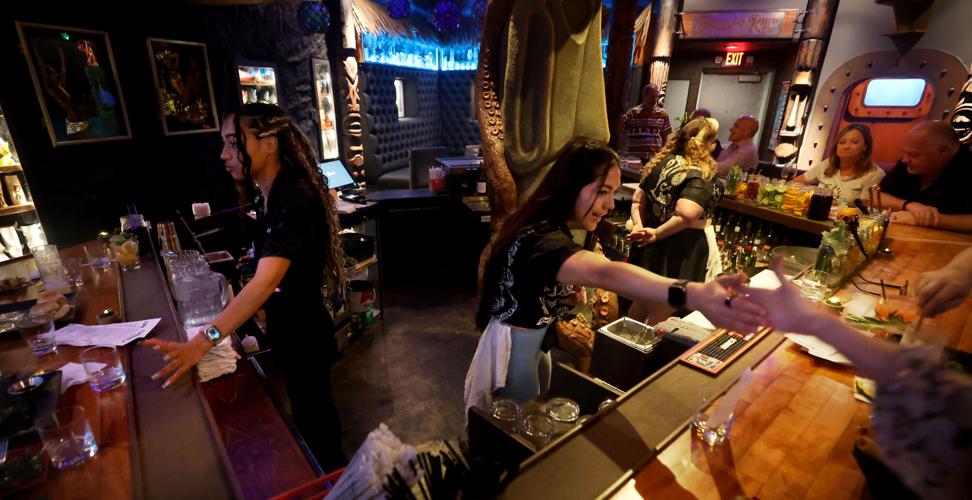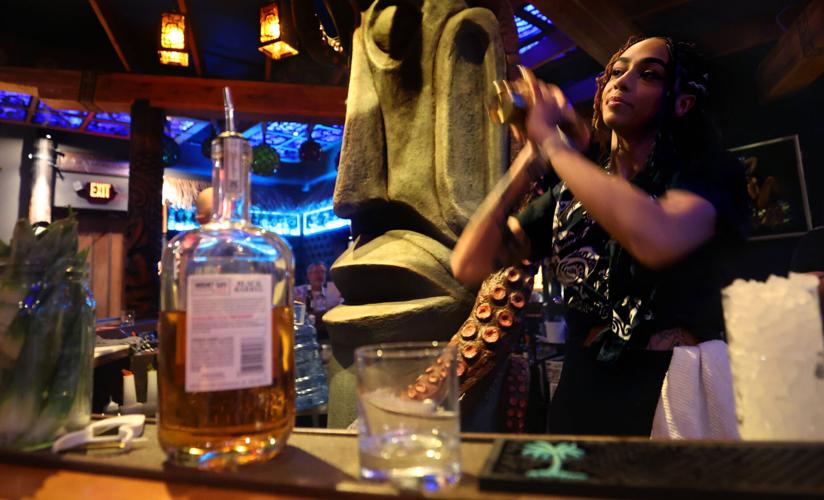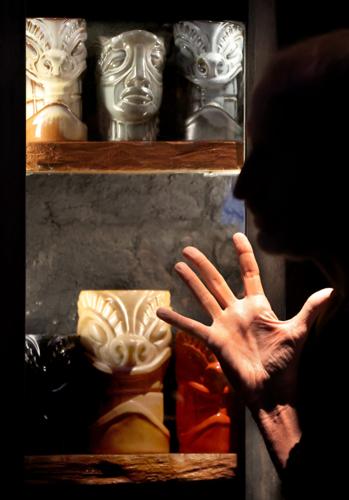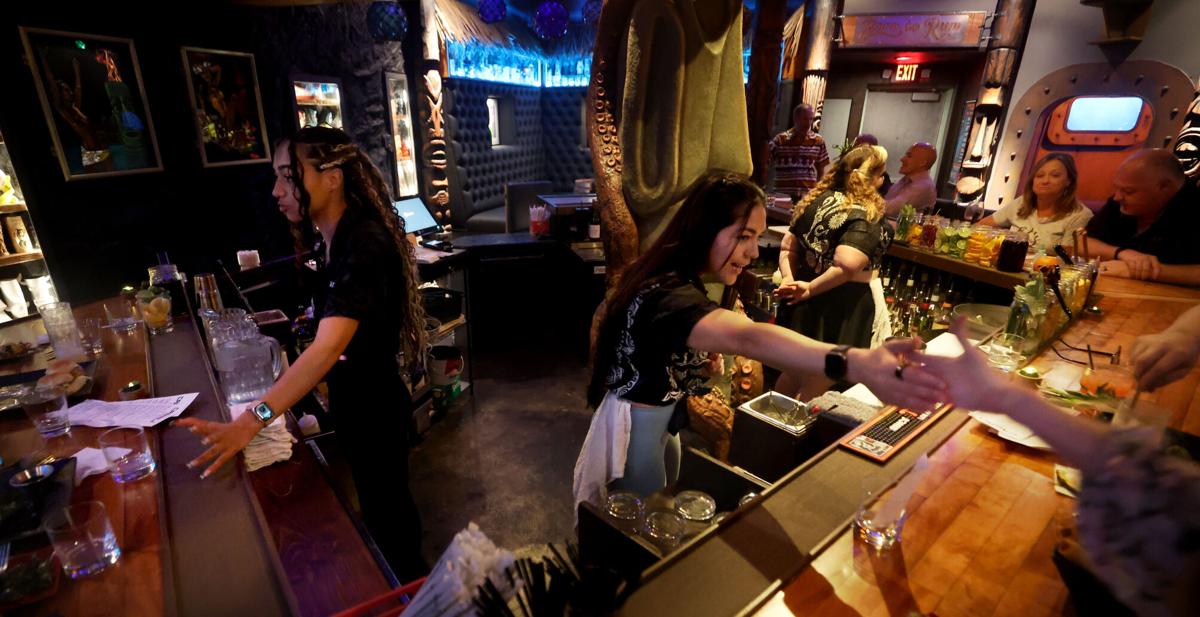There's a 500-pound bronze door in an area that looks like the entrance to Cabali — but you can't open the door and it's actually not an entrance at all.
If you're like me, you'll go inside the main restaurant, which is right next door, and ask where the new tiki bar is. The bartender will tell you to wind around the back patio, down a secluded sidewalk.
You'll take a brief stroll along the backside of the restaurant, in an area you'll feel you shouldn't be.
You'll see a wall covered in ivy. You'll probably walk right by it, like I did, without realizing a door is hidden in the shrubs.
When you finally find the door concealed in greenery, you'll be transported to a dark room. You aren't in Oro Valley anymore.
Tiki mugs are on display high on the wall along with black velvet paintings by local artist Diane Bombshelter. Drinks sit atop barrels, dim lights flicker as they hang from the ceiling. A bar is centered in the room with a tiki carving right in the middle.
This is Cabali, a modern speakeasy-style tiki bar that opened in February, next to The Landing at 8195 N. Oracle Road. The bar is headed by Doug "Fini" Finical who runs The Landing and sister restaurant Fini's Landing with Scott Mencke and Tyler Moody.

Bartender Jordan Larsen shakes up an order for a Painkiller, the No. 1 drink on the card at Cabali, on March 14.
1,000 tiki mugs later
Finical has always had a thing for beach culture. He grew up in Tucson, taking trips to Southern California — including Disneyland and its famed Enchanted Tiki Room.
When he was a graphic artist, he was especially drawn to oceanic art.
"It was my 'aha!' thing," he says. "I don't know why. Sometimes it's hard to put into words why you're touched by a particular topic."
His two restaurants are built on the beach theme and he also helped open The Hut on Fourth Avenue — the bar with the giant tiki head out front.
He's read tiki literature, especially Sven Kirsten's "The Book of Tiki," which Finical says helped reintroduce tiki to pop culture. He dubs the book "the bible, the encyclopedia, of the Polynesian pop era in America."
"Tiki is the manifestation of exotic visions of island culture borrowed from tales told by American soldiers stationed in the South Pacific during World War II," the book says. "Americans seized these visions and incorporated fantasy into reality: mid-century fashion, popular music, eating and drinking, and even architecture were influenced by the tiki trend."
It was more than a fad at the time, Finical says, with Trader Vic's and Don the Beachcomber opening bars until eventually only a few were left to survive.
"It was this whole idea that American pop culture had been around long enough that parts of it was being lost and being rediscovered," Finical says.

Owner Douglas “Fini” Finical chats with a couple customers stopping in for a drink at his new tiki bar, Cabali.
Finical has spent decades collecting more than 1,000 tiki mugs — a collection that he lovingly calls an obsession.
Many of his mugs are on display at Cabali. Soon, all of them will be encased in an installation at the tiki bar.
"I was pretty sure we wouldn't have quite enough room (for all 1,000), but I didn't know until the day we opened," Finical says. "Another local collector actually took care of the packaging and moving, and it wasn't until after the day of the grand opening, I was sleep deprived and didn't realize 30% of them were still at my house."
Eventually, you'll be able to order a drink at Cabali and take home the tiki mug it's served in. (The tiki mug will be designed by TikiRob. Yes, Finical has slept overnight at a tiki convention to snag a mug by the famous TikiRob.)
"The resurgence of tiki almost tracks with the rise of the internet," Finical says. "There was a place called Tiki Central, where you'd post something to somebody and wait three days for somebody to answer. Those days, no one wanted to put their real name on the internet so we had names like 'Big Bro Tiki' and 'Monkey Boy.' You'd read about tiki mugs and then eBay came out and you're like, 'Oh, I can get these.'"
"eBay had maybe five to six years where everybody went through their dead grandma's closets or whatever and you could get a lot of these mugs for a very inexpensive price. Pretty soon, that was sort of all fished out and you couldn't get them anymore," he says.
Companies like Tiki Farm, Munktiki and Bosko stepped up, playing a part in the tiki mug craze that's now known as an art form.
"You're talking about something that is not unlike a painting," Finical says. "A blank canvas isn't worth very much until an artist puts their talent or spirit — or in the case of tiki, their mana — into something."
Finical didn't start his mug collection with the intention of opening a bar. But because it happened the way it has, Finical is happy to reintroduce the art form to the public, instead of keeping his hundreds of mugs packed up at home.

Bartender Tiana Flores mixes up a drink behind the angular bar at Cabali.
A bar with lore — a bar with a story
Cabali was actually meant to be a private room, a space next to The Landing for patrons to host rehearsal dinners and board meetings.
"I said we should do a speakeasy because I didn't want people showing up to a tiki bar and see it was rented (to a private party)," Finical says. "But it kept getting bigger — when it was finally completed, it was way overdue and way over budget."
It was important for Finical to create something that was spot-on and appreciated by tiki enthusiasts — the ones immersed in tiki subculture who collect the mugs, travel to tiki conventions and know the literature. He wanted to get it right.
But Cabali also needed to appeal to the average person.
"What is fascinating to me, or the challenge I guess, is to do something that if you were a purist and knew about all these forms, you'd know that the sculpture (behind the bar) was a Mark Thomas (replica)," he says. "But if not, you'd just think it's dope. It has to be cool in and of itself. It doesn't matter if (they) don't know what this is, if it touches them."
A visit to Cabali is an experience, a marriage of tiki and modernism. It's just a perk that food and drinks are part of it.

Jordan Larsen puts the finishing touches on the Junglebird, one of the drinks on the menu at Cabali.
Cabali features a menu of nine specialty cocktails that includes the Painkiller, with Jamaican dark rum and coconut liqueur; the Tandori Express, with smoked pineapple rum, coconut liqueur and curry sauce; and the $65 rum cocktail Zombie Bow, which is $65 for a reason — it's for a minimum of four people. Barrio Brewing Co. is also releasing a private-label beer for Cabali dubbed Tiki Barrio.
Bites include Spam sliders, wonton tacos, curried short ribs and coconut shrimp.
But before the menu, Finical's first step when building Cabali was to remove any reference to the outside world. There are no windows and no TVs. You won't see any of the bartenders on their phones.
"To me, you should not just forget where you are, but when you are," he says.
"Cabali is not contrived. The buzz word is these immersive experiences. Tiki very much lends itself to that because it's so escapist in its nature," he says. "I personally wanted to create a space that challenges everything we see in an Amazon-driven world."
You won't find any of the furniture on a barstool manufacturing website because it was all custom-made. The exit door was salvaged from the University of Arizona's student union in the '80s and hadn't found a home until now. The bar itself is made of Rincon High School's old gym floor — the panels had been sitting outside Finical's house for 15 years. The beams are from St. Thomas Church.
"I could get a beam from Home Depot, but it doesn't have the lore. It doesn't have the story," Finical says.
Finical's love for architecture and design was likely instilled in him by his father, Irv. In a way, Cabali is for him, Finical says.
"There's a pattern I'm using in a lot of different forms in the lighting that's something I found in my father's 1958 senior thesis. But nobody had ever seen it. It's not on the internet," he says.
Irv Finical was an architect who worked on the UA stadium, Rincon High School and the largest high rise in the state at the time.
"When I was young, we didn't go out and throw the baseball around. We would draw," Finical says. "It wasn't intentional, but when you do anything, you learn things about yourself that were sort of there the whole time."
While Cabali is Finical's brainchild, he gives credit where credit is due.
"I worked with the most incredible artists," he says, shouting out project architect Jay Hanson, who he met while lifeguarding for Pima County in 1980, Matt Cotten who learned to carve after looking at Finical's mug collection and reading through tiki literature, and local musician Jimmy Carr who headed construction and put in hours of his time and vision.
Finical also talked Tom Prevatt out of retirement to create the tiki centerpiece behind the bar at Cabali — Prevatt is the same artist who created the iconic T-rex outside of the McDonald's on Tanque Verde.
"Cabali was really built by these people," Finical says. "I was so fortunate to play conductor but they were just amazing."
Tiki obsession turned movie
Alongside his new venture, a not-yet-released documentary dubbed "Cabali and The Tiki Mug Obsession" follows Finical on his journey through designing and opening the Oro Valley tiki bar.
"I'm trying to do something that's so over the top and purist and still pushing forward in tiki and keeping one eye on the past," he says in the trailer for the documentary.
When the giant tiki was passed on from the now-shuttered Magic Carpet Golf to Fourth Avenue's The Hut, local film student Joshua Dragotta asked if he could document the move.

Owner Douglas “Fini” Finical talks about a few of the more rare tiki mugs in his collection.
"He came back with this seven-minute thing that was just wonderful because it encapsulated such a crazy part of my life," Finical says.
Dragotta went on to work in Los Angeles' film industry, coming back to Tucson to work remotely during the pandemic. Around that same time, Finical had lunch with an old friend, graphic artist and producer Mike Clements. Clements suggested they create a time-lapse of Cabali being built.
"By the end of that lunch, we decided to do the production we always wanted to do together," Finical says. He called up Dragotta.
"I knew he liked it immediately because he started taking notes," Finical says.
What was originally supposed to be a 12-minute video to promote Cabali has turned into a full-length documentary about tiki culture featuring interviews from musician Todd Rundgren and his wife Michele who own a tiki bar, and Kate Flannery of "The Office" fame, who is a big tiki fan.
"You couldn't tell the story of tiki in 12 minutes," Finical says. "We just didn't know until the grand opening (of Cabali) if it would have a happy ending or not."
"To me, Cabali is already successful," he says. "I'm sure the bank feels differently but to me, it's a personal journey."










